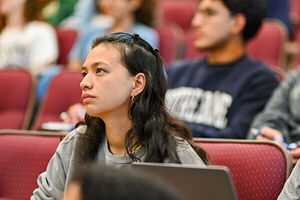
For the 2.2 million U.S. farm workers who identify as Hispanic, long working hours and rapidly changing climates are leading to serious health challenges. Efforts to address these health concerns often face additional obstacles such as limited options for care, language barriers, and financial instability.
The interrelatedness of these issues led Clayton Glasgow, a Latino Studies and Sustainability double minor with an Environmental Science major through the Department of Biological Sciences, to enroll in a course called “Latino Health: Social, Cultural, and Scientific Perspectives.” The seminar, aimed at upper-level undergraduates, is cosponsored by the Latino Studies and Health, Humanities, and Society (HHS) academic programs.
Glasgow addressed these health challenges to fulfill the capstone requirement for Latino Studies with his final paper, "Doubly Burdened: Latinx Farmworker Health in a Changing Climate," which won the José E. Limón Best Paper Award competition for contributing exemplary research in the field of Latino studies. “The primary threat right now for farmworkers is extreme heat and heat-related illness, but shifting vector-borne and fungal disease distributions, more intense storms, and food insecurity are emerging issues that need to be considered,” he explains.
The idea for this unique, cross disciplinary course was born out of conversations in 2021 between Karen Richman and Nydia Morales-Soto. Richman, a cultural anthropologist, is Director of Undergraduate Studies at the Institute for Latino Studies (ILS), and affiliated faculty in HHS, the Eck Institute for Global Health, as well as the Kellogg Institute for International Studies. Morales-Soto, a microbiologist and molecular biologist with global health expertise, is Assistant Director of the Eck Institute for Global Health, and affiliated faculty in ILS and HHS.

Recognizing the strong interest in Latino health by many undergraduate students like Glasgow, who were pursuing majors or minors in Latino Studies, they envisioned a course that offers students the unique opportunity to critically analyze health challenges that intersect with both socio-cultural and scientific discussions. The “Latino Health: Social, Cultural, and Scientific Perspectives” course is a result of the collaboration between Richman and Morales-Soto and their institutes.
Julia Ruelle, a Biological Sciences major with minors in the Glynn Family Honors Program, HHS and Latino Studies, is currently enrolled in the course while working in the Culture of Medicine Lab directed by Vania Smith-Oka, a professor in the Department of Anthropology. Smith-Oka, director of HHS Program of the Reilly Center for Science Technology and Values, who is a faculty fellow of the Eck Institute and the Kellogg Institute for International Studies, has conducted extensive research on cesarean section decision-making in Latin America.
Ruelle’s work in the lab uses a classification system to compare high rates of cesarean sections in Saint Joseph County as well as in Puebla, Mexico. “This semester I have learned so much more about the gender dynamics that are present in various Latino cultures, especially Mexico,” says Ruelle. Tying her work in the lab back to the course, she further explains, “these dynamics can influence the societal valuing of women’s health, especially as it relates to decision-making during childbirth.”
Richman explains that, “by applying our combined expertise in the classroom, we are creating a multifaceted, integrative approach to Latino health, which considers both the scientific bases of specific diseases affecting Latinos as well as the social, cultural, economic, and environmental factors that increase risk and limit access to therapy.”

Richman and Morales-Soto are optimistic that the course curriculum is educating a new generation of scholars that are committed to a deeper understanding of health inequity in minority communities, and inspired by the potential to apply these skills to future health-related careers.
“This collaboration is enabling Notre Dame students to explore the complexities of community health while offering the unique opportunity to critically examine challenges that disproportionately affect Hispanic/Latino populations,” says Morales-Soto. She adds that the course is, “fostering a more inclusive and informed generation of leaders irrespective of their fields of study.”
The course is offered to all undergraduate students each fall. For more information on other courses offered through the ILS, please visit their website.
Contact
Christine Grashorn, Communications Specialist
Notre Dame Research / University of Notre Dame
cgrashor@nd.edu / 574.631.4856
research.nd.edu / @UNDResearch
About the Eck Institute for Global Health
The Eck Institute for Global Health (EIGH), an integral part of Notre Dame Research, builds on the University’s historical strength in infectious disease research, including vector-borne diseases, while broadening the interdisciplinary expertise into other key global health areas including maternal, newborn, & child health (MNCH), community health, mental health, nutrition and non-communicable diseases, the environment and health, health analytics and technologies, and health systems and organizations. Our team of interdisciplinary researchers and their students holistically address health disparities around the world. EIGH faculty affiliates recognize health as a fundamental human right and promote research, training, and service to advance health standards for all people, especially those in resource-poor countries who are disproportionately impacted by preventable diseases. The EIGH is training the next generation of global health researchers and leaders through undergraduate, Master of Science in Global Health, doctoral, and postdoctoral programs.
About the Institute for Latino Studies
The Institute for Latino Studies (ILS) advances understanding of the fastest-growing and youngest population in the United States and the U.S. Catholic Church. It strengthens the University of Notre Dame’s mission to prepare transformative leaders in all areas of society, including the arts, sciences, business, politics, faith, and family life. The vision of ILS is to foster a deeper understanding of Latino communities to empower faculty, students, and society to make better strategic decisions as to what kind of a country is being created for children and grandchildren. The ILS strives to achieve its mission by providing faculty and student support in the areas of Research, Academics, Leadership, Community Engagement, and Latino Spirituality.